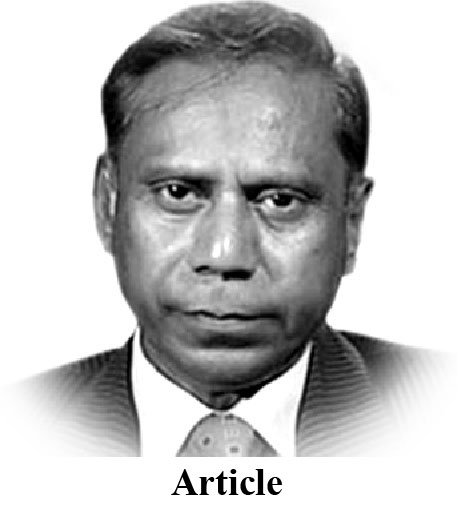Sultan M Hali
SEVEN years ago, Muhammad Afzal Guru was ex
ecuted in secrecy, without being allowed to meet
his loved ones and buried quietly in Delhi’s Tihar jail on February 9, 2013. Afzal Guru had been accused of aiding and abetting the December 13, 2001 attack on the Indian Parliament. Afzal Guru was born in Sopore in the Baramulla District of India-occupied Kashmir (IOK) in 1969. As a medical student at Jhelum Valley Medical College, Srinagar, Guru was motivated by a friend to join the Kashmir liberation jihad. He later surrendered to security forces and after graduation, took up a job with a pharmaceutical firm in New Delhi and became its area manager. On December 13, 2001, a deadly attack took place on the Indian Parliament building in New Delhi. 14 people were killed and at least 22 were injured. Afzal Guru was blamed for the attack and quoting leads relating to the car used and cellphone records, he was arrested from Srinagar, his cousin Shaukat Husain Guru, Shaukat’s wife Afsan Guru and S A R Gilani, a lecturer of Arabic at Delhi University were also arrested.
The two most incriminating pieces of evidence presented against Guru were a cellular phone and a laptop confiscated at the time of arrest. They were not sealed, as evidence is required to be but were accepted as proof of his guilt. During the trial it emerged that the hard disk of the laptop had been accessed after the arrest. It only contained the fake Home Ministry passes and the fake identity cards that the ‘terrorists’ used to enter Parliament — and a Zee TV video clip of Parliament House. According to the police, Guru had deleted all the information except the most incriminating bits. The police witness said he sold the crucial SIM card that connected all the accused in the case to one another to Guru on December 4, 2001. But the prosecution’s own call records showed the SIM was actually operational from November 6, 2001.
In the ensuing aftermath, India blamed Pakistan for sponsoring the attack and amassed its troops on the Pakistani border. Swift deployment of its counter-offensive ground, sea and air forces by Pakistan deterred the bellicose Indians from attacking. The two forces remained in an eyeball to eyeball position for ten months. Even a tiny spark could have pushed the two nuclear armed nations into mutually assured destruction. India blinked first since the mobilization was costing it more than it had anticipated and decided to withdraw. Indian Journalist Vinod K. Jose claimed that in an interview in 2006, Guru had confided that he had been subjected to extreme torture which included electric shocks in private parts and being beaten up for hours along with threats regarding his family after his arrest. In the interview, Guru confirmed that he was tasked by DSP Davinder Singh to take ‘someone’ to Delhi. Afzal was to find a rented house for him in Delhi. This ‘someone’ was identified as one of the five gunmen who attacked Parliament. During the stay, the would-be assailant was in constant touch with DSP Davinder Singh. Afzal Guru’s role ended here yet he was named as the mastermind of the deadly assault. The quartet was tried under charges of waging war, conspiracy, murder, attempt to murder etc with the provisions of the Prevention of Terrorism Act, 2002 (POTA) being added to the original charges. On 18 December 2002, relying on the circumstantial evidence, the special court awarded capital punishment to Guru, Shaukat and Geelani. Shaukat’s wife Afsan was found guilty of concealing the plot and sentenced to five years in jail. The prison took steps to execute Guru in secrecy.
The execution was carried out without the family’s knowledge or any form of public announcement. Guru’s body was buried on prison grounds to prevent a public funeral. Renowned human rights activist Arundhati Roy, in her opinion piece on the subject titled The hanging of Afzal Guru is a stain on India’s democracy published in The Guardian on February 10, 2013, two days after Afzal Guru was furtively sent to the gallows, writes that the Indian Supreme Court judgment acknowledged the evidence was circumstantial: ‘As is the case with most conspiracies, there is and could be no evidence amounting to criminal conspiracy.’ But then, shockingly, it went on to say: ‘The incident, which resulted in heavy casualties, had shaken the entire nation, and the collective conscience of society will only be satisfied if capital punishment is awarded to the offender.’
The more one studies it, the more the attack on the Indian parliament seems like an Indian false flag operation to justify punitive action against Pakistan. Following the 9/11 attacks, India was certain that Pakistan would also be targeted by the US and NATO for supporting terrorism. Pakistan thwarted the move by allying itself to the US. Believing that the US was preoccupied with its military operations in Afghanistan, India could get away with a swift assault on Pakistan, it conjured an excuse to do so. It was Pakistan’s swift military manoeuvring and positioning of its forces that foiled the Indian plot. Afzal Guru was a prisoner of conscience. After having surrendered to security forces in 1993, he was constantly being harassed by security agencies and tortured every time an attack took place. Amnesty International questioned his sentence stating that he did not receive adequate legal representation and that his execution was carried out in secrecy. If this was not travesty of justice, what is?
—The writer is retired PAF Group Captain and a TV talk show host.








